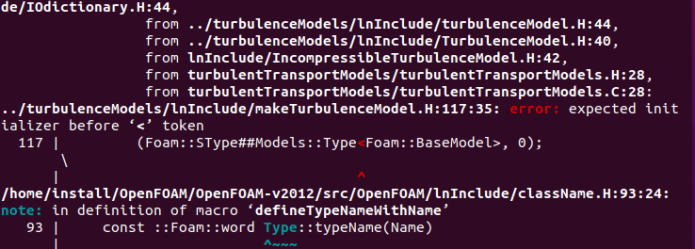OpenFOAM中编译新的湍流模型报错
-
这是我的.C文件```
/---------------------------------------------------------------------------\\ / F ield OpenFOAM: The Open Source CFD Toolbox \ / O peration \ / A nd www.openfoam.com \/ M anipulation
Copyright (C) 2011-2017 OpenFOAM Foundation Copyright (C) 2019 OpenCFD Ltd.
License
This file is part of OpenFOAM.OpenFOAM is free software: you can redistribute it and/or modify it under the terms of the GNU General Public License as published by the Free Software Foundation, either version 3 of the License, or (at your option) any later version. OpenFOAM is distributed in the hope that it will be useful, but WITHOUT ANY WARRANTY; without even the implied warranty of MERCHANTABILITY or FITNESS FOR A PARTICULAR PURPOSE. See the GNU General Public License for more details. You should have received a copy of the GNU General Public License along with OpenFOAM. If not, see <http://www.gnu.org/licenses/>.*---------------------------------------------------------------------------*/
#include "kEpsilonNNQuadraticTrain.H"
#include "bound.H"
#include "wallFvPatch.H"
#include "nutkWallFunctionFvPatchScalarField.H"
#include "addToRunTimeSelectionTable.H"// * * * * * * * * * * * * * * * * * * * * * * * * * * * * * * * * * * * * * //
namespace Foam
{
namespace incompressible
{
namespace RASModels
{// * * * * * * * * * * * * * * Static Data Members * * * * * * * * * * * * * //
defineTypeNameAndDebug(kEpsilonNNQuadraticTrain, 0);
addToRunTimeSelectionTable(RASModel, kEpsilonNNQuadraticTrain, dictionary);// * * * * * * * * * * * * Protected Member Functions * * * * * * * * * * * //
void kEpsilonNNQuadraticTrain::correctNut()
{
correctNonlinearStress(fvc::grad(U_));
}void kEpsilonNNQuadraticTrain::correctNonlinearStress(const volTensorField& gradU)
{
timeScale_=k_/epsilon_;// Linear (nut) nut_ = -g1_*k_*timeScale_; nut_.correctBoundaryConditions(); // Quadratic (tau_NL) volSymmTensorField S(timeScale_*symm(gradU)); volTensorField W(timeScale_*skew(gradU)); nonlinearStress_ = 2*k_ *( g2_ * twoSymm(S&W) + g3_ * dev(innerSqr(S)) + g4_ * dev(symm(W&W)) );}
// * * * * * * * * * * * * * * * * Constructors * * * * * * * * * * * * * * //
kEpsilonNNQuadraticTrain::kEpsilonNNQuadraticTrain
(
const geometricOneField& alpha,
const geometricOneField& rho,
const volVectorField& U,
const surfaceScalarField& alphaRhoPhi,
const surfaceScalarField& phi,
const transportModel& transport,
const word& propertiesName,
const word& type
)
:
nonlinearEddyViscosityincompressible::RASModel
(
type,
alpha,
rho,
U,
alphaRhoPhi,
phi,
transport,
propertiesName
),Ceps1_ ( dimensioned<scalar>::lookupOrAddToDict ( "Ceps1", coeffDict_, 1.44 ) ), Ceps2_ ( dimensioned<scalar>::lookupOrAddToDict ( "Ceps2", coeffDict_, 1.92 ) ), sigmak_ ( dimensioned<scalar>::lookupOrAddToDict ( "sigmak", coeffDict_, 1.0 ) ), sigmaEps_ ( dimensioned<scalar>::lookupOrAddToDict ( "sigmaEps", coeffDict_, 1.3 ) ), k_ ( IOobject ( IOobject::groupName("k", alphaRhoPhi.group()), runTime_.timeName(), mesh_, IOobject::MUST_READ, IOobject::AUTO_WRITE ), mesh_ ), epsilon_ ( IOobject ( IOobject::groupName("epsilon", alphaRhoPhi.group()), runTime_.timeName(), mesh_, IOobject::MUST_READ, IOobject::AUTO_WRITE ), mesh_ ), g1_ ( IOobject ( "g1", runTime_.timeName(), mesh_, IOobject::MUST_READ, IOobject::AUTO_WRITE ), mesh_ ), g2_ ( IOobject ( "g2", runTime_.timeName(), mesh_, IOobject::MUST_READ, IOobject::AUTO_WRITE ), mesh_ ), g3_ ( IOobject ( "g3", runTime_.timeName(), mesh_, IOobject::MUST_READ, IOobject::AUTO_WRITE ), mesh_ ), g4_ ( IOobject ( "g4", runTime_.timeName(), mesh_, IOobject::MUST_READ, IOobject::AUTO_WRITE ), mesh_ ), timeScale_ ( IOobject ( "timeScale", runTime_.timeName(), mesh_, IOobject::NO_READ, IOobject::AUTO_WRITE ), mesh_, dimensionedScalar("timeScale", dimTime, scalar(0.0)) ){
bound(k_, kMin_);
bound(epsilon_, epsilonMin_);if (type == typeName) { printCoeffs(type); }}
// * * * * * * * * * * * * * * * Member Functions * * * * * * * * * * * * * //
bool kEpsilonNNQuadraticTrain::read()
{
if (nonlinearEddyViscosityincompressible::RASModel::read())
{
Ceps1_.readIfPresent(coeffDict());
Ceps2_.readIfPresent(coeffDict());
sigmak_.readIfPresent(coeffDict());
sigmaEps_.readIfPresent(coeffDict());return true; } return false;}
void kEpsilonNNQuadraticTrain::correct()
{
if (!turbulence_)
{
return;
}nonlinearEddyViscosity<incompressible::RASModel>::correct(); tmp<volTensorField> tgradU = fvc::grad(U_); const volTensorField& gradU = tgradU(); volScalarField G ( GName(), (nut_*twoSymm(gradU) - nonlinearStress_) && gradU ); // Update epsilon and G at the wall epsilon_.boundaryFieldRef().updateCoeffs(); // Dissipation equation tmp<fvScalarMatrix> epsEqn ( fvm::ddt(epsilon_) + fvm::div(phi_, epsilon_) - fvm::laplacian(DepsilonEff(), epsilon_) == Ceps1_*G*epsilon_/k_ - fvm::Sp(Ceps2_*epsilon_/k_, epsilon_) ); epsEqn.ref().relax(); epsEqn.ref().boundaryManipulate(epsilon_.boundaryFieldRef()); solve(epsEqn); bound(epsilon_, epsilonMin_); // Turbulent kinetic energy equation tmp<fvScalarMatrix> kEqn ( fvm::ddt(k_) + fvm::div(phi_, k_) - fvm::laplacian(DkEff(), k_) == G - fvm::Sp(epsilon_/k_, k_) ); kEqn.ref().relax(); solve(kEqn); bound(k_, kMin_); // Re-calculate viscosity and non-linear stress correctNonlinearStress(gradU);}
// * * * * * * * * * * * * * * * * * * * * * * * * * * * * * * * * * * * * * //
} // End namespace RASModels
} // End namespace incompressible
} // End namespace Foam// ************************************************************************* //


